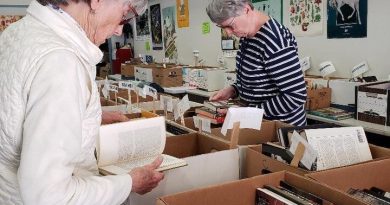Collaborative makes farming certification classes possible
Would-be, intermediate and experienced gardeners and small farmers are the winners as Feather River College and Lassen, Plumas, Sierra Community Action Agency join forces to offer a new certificated gardening program beginning in January 2019.
A new certificate in Ecological Farming is “really meant for a wide range of people,” explained Darla DeRuiter, program coordinator. Whether it’s a high school student wanting to save the world through small farming operations, intermediate gardeners who have a little experience growing food, or small farmers who have a few seasons under their belts and want to learn more, there’s room for everyone.
“FRC is one of the few rural community colleges in California so we’re in a unique position to offer a sustainable agriculture program,” DeRuiter explained. “Plumas County already has skilled farmers and strong community support for local food, which provides the foundation for a real-world learning laboratory to explore the positive economic, social and environmental benefits that small farms can offer a community,” she said.
The certificate
To attain a certificate in Ecological Farming, students must participate in three semesters of classes. Traditionally classes are offered in the spring, summer and fall — the beginning, height of growing seasons, harvest and extended growing seasons. While signups are now underway, DeRuiter said that students can start the program during any semester.
To create this new program, DeRuiter said that she worked with local farmers in designing the Ecological Farming Certificate. That means, it’s intended for those interested in local growing conditions — not what’s recommended for the Midwest or California’s agricultural valleys.
This certificate is created for those looking to turn farming into a full-time profession, and even those looking to scale up their personal garden, she explained.
During the yearlong program, that nets students 14 to 15 units, students will learn to start and efficiently operate their own farm, manage existing farms, or work for organizations promoting farm and food education and production, DeRuiter said.
“We were very deliberate in designing the program to create the optimal combination of classroom activities and practical, hands-on learning opportunities in a supportive environment,” DeRuiter said.
“I’m excited that the program offers something for people at all levels of the food spectrum — from high school students looking to connect people with real food to local community members who want to ramp up their home gardening skills and save some money at the same time,” she added.
Jessie Mazar, a skilled farmer, is running this new program. She has taught high altitude agriculture in the Andes of Ecuador and in Malawi in Africa. She has also worked at a number of locations in the United States, DeRuiter explained about the instructor’s background. And the high altitude farming, with its shorter growing season, is exactly what Plumas gardeners require for local success.
“Ecological farming helps people understand that the simple act of eating has an ecological and social ripple effect,” Mazar explained. “The ways that the soil is treated and the plants are taken care of have a significant impact on the health of our climate and our communities.”
In this program, students are encouraged to re-envision a food system that values everyone from farmer to the consumer, DeRuiter explained.
It respects our plants, and nurtures the connections between people and their food.
Plumas County has seen dramatic growth in its local, small-scale agricultural community over the last several years, DeRuiter pointed out. As both climate change and buying trends encourage food systems to become more localized, farmers will need to learn techniques for growing food in less-than-optimal climates.
Getting started
Some of the courses include, ecological production methods; techniques for high-altitude, diversified crop production and season extension; marketing and business management skills; and small farms as a tool for positive social, economic and environmental change.
In January, when the weather is too cold to garden outdoors, the courses begin with how to build community and develop teamwork. Classes focus on how food works from the local to the global level and from soils to farm economics.
“The certificate will complement a variety of schedules — whether you’re working or going to school, we designed the Ecological Farming Certificate classes to fit into your life,” DeRuiter explained.
Follow Your Heart Farm, located west of Quincy, is a diversified, small farm and the field site for course work and labs. Collaboration with this farm will provide practical experience in the operation and marketing of a for-profit farm.
“I enjoy working outdoors and the satisfaction of growing healthy food,” said Laura Rodriquez of Follow Your Heart Farm. “Small market farmers are important contributors to local food systems. We are all better off when they are supported and can maintain viability.”
Follow Your Heart Farm offers a diverse opportunity for students. Besides raising vegetables, the farm also grows berries, and has fruit trees, American guinea hogs, chickens and goats.
Another site on the list is the old tennis courts at Gansner Park. This was formerly used for a gardening/education program for families for Plumas County Literacy.
The partnership
LPSCAA Executive Editor Roger Diefendorf was before the Plumas County Community Development Commission Board of Commissioners on Tuesday, Oct. 16, explaining the new farming project with FRC.
CAA for Plumas County is putting up $35,000 in LPSCAA discretionary funding toward the Ecological Farming Certificate, Diefendorf explained to commissioners.
Although this is a Plumas County-based program, there are no geographical limitations where students come from.
Diefendorf told commissioners that federal laws are changing. They’re becoming more burdensome.
In the past LPSCAA, which is under the umbrella of the Community Development Commission, gave out small grants to approved nonprofit agencies and programs. “We’re the only county that does teeny tiny grants,” said Supervisor Lori Simpson, who is also a commissioner. Other counties do larger grants with the funding they receive. She later said that she was glad that this program is available to the entire county and not just Quincy.
But with changing federal requirements, Supervisor Michael Sanchez said there are more timelines and criteria interjected into what local programs must do for their funding. Sanchez is also a commissioner.
Looking for a program that would better meet new federal requirements, Diefendorf said he wanted something that would also have meaning for multiple groups of local people. That’s when the idea of a local training program coupled with needed food production came to mind.
Diefendorf told commissioners that he and DeRuiter “work extremely well together.”
What Diefendorf would like to see is people trained to become farmers and gardeners. He wants them to produce crops that can be used by public schools and food pantry programs.
Diefendorf said that he didn’t want the program to “step on toes” of local businesses, as it offers food to local groups, but there’s not much chance at this point that Plumas County could raise the amount of food even just the schools might require.
“I don’t see anything wrong with it,” said Supervisor Jeff Engel as the chair of the CDC commission.
The cost of the program is $850, but all interested students are encouraged to discuss financing opportunities with FRC’s financial aid.
For more information on the Ecological Farming Certificate program visit frc.edu/envr or email Dr. Darla DeRuiter at [email protected]. The web site also includes how to enroll in the program.




